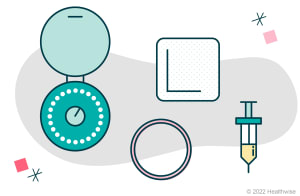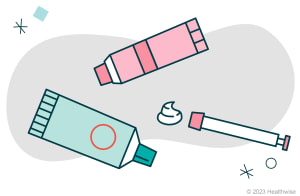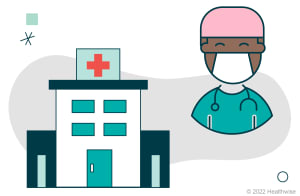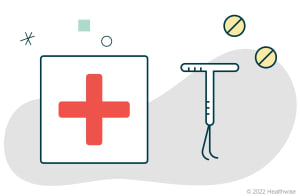Health Library
Our Health Library information does not replace the advice of a doctor. Please be advised that this information is made available to assist our patients to learn more about their health. Our providers may not see and/or treat all topics found herein.
Birth Control
Overview
Birth control is any method used to prevent pregnancy. Another word for birth control is contraception.
If you have vaginal sex without birth control, there is a chance that you could get pregnant. This is true even if you have not started having periods yet or you are getting close to menopause.
The only sure way to prevent pregnancy is to not have vaginal sex. But finding a method of birth control that works for you can help you avoid an unplanned pregnancy.
Be sure to tell your doctor about any health problems you have or medicines you take. Your doctor can help you choose a birth control method that will work for you.
Types of Birth Control
There are many kinds of birth control. Each has pros and cons. Find what works for you.

Long-acting reversible contraception (LARC). These are placed inside your body by a doctor. They can prevent pregnancy for years.
Examples include:
- An implant (hormonal).
- Copper intrauterine device (IUD).
- Hormonal IUDs.

Short-acting hormonal methods. These release hormones (estrogen and progestin, or progestin only).
Examples include:
- Combination birth control pills ("the pill").
- Skin patches.
- A vaginal ring.
- A shot.
- Mini-pills.

Barrier methods. Use these every time you have vaginal sex.
Examples include:
- External (male) condoms.
- Internal (female) condoms.
- Diaphragms.
- Cervical caps.
- Sponges.

Spermicides. These kill sperm or stop sperm from moving. They can be a gel, cream, foam, film, or tablet. Use them before vaginal sex.
Examples include:
- Nonoxynol-9.
- pH regulator gel.

Fertility awareness. You'll learn when you're most likely to become pregnant (fertile). You can avoid vaginal sex at that time.
It's also called:
- Natural family planning.
- The rhythm method.

Permanent birth control (sterilization). This can be an option if you're sure that you don't want to get pregnant later.
This includes:
- Vasectomy.
- Having tubes tied (tubal ligation).

Emergency contraception. This is a backup method. Use it if you didn't use birth control or your birth control method failed.
Examples include:
- Copper and hormonal IUDs.
- Emergency contraceptive pills.
Birth control following pregnancy
Talk to your doctor about the options for birth control after your delivery. They include implants and intrauterine devices (IUDs), hormonal methods, and barrier methods. Many types of birth control are safe to use if you're going to breastfeed. But some work better than others.
Learn more
Watch
Choosing a Birth Control Method
Before you choose birth control, you might think about:
How well it works.
![]()
- Some types work better than others to prevent pregnancy.
- Think about how important it is for you to not get pregnant.
How easy it is to use.
![]()
- Some types are taken daily.
- Other types are used each time you have vaginal sex.
- Others work for years without you having to do anything.
- For some, you'll avoid vaginal sex at certain times.
How much it costs.
![]()
- Some types are free in some clinics.
- Other types cost a lot at first but work for years.
- Insurance may cover prescription birth control.
Whether it protects you from sexually transmitted infections (STIs).
![]()
- Condoms can help protect you.
Whether it uses hormones.
![]()
- Some release estrogen and progestin. Some release progestin only.
- There are many choices, such as pills, patches, a ring, or IUDs.
If you want to get pregnant later.
![]()
- Some types allow you to get pregnant soon after you stop taking them.
- It may take months to become fertile again after stopping other types.
- Some types are meant to be permanent.
How easy it is to get.
![]()
- Some types are placed by a doctor.
- Others need a prescription.
- Some are available over the counter (OTC).
Privacy.
![]()
- Some types are easier to keep private.
- Others need to be used often and may be less private.
How it fits into your life.
![]()
- Some types interrupt sex.
- After other types are placed, you don't have to do anything.
- For some types, you'll avoid vaginal sex at certain times of your menstrual cycle.
If you have health problems.
![]()
- You may not be able to use certain types if you:
- Smoke.
- Just had a baby.
- Have had breast cancer.
- Some types may help with acne or period problems, such as heavy bleeding.
Time and effort to use
Birth control must be used correctly in order to prevent pregnancy. When you decide which birth control method to use, be honest about how much effort you are willing to put into birth control. If you aren't comfortable with or might not consistently use a birth control method for any reason, that method isn't likely to be reliable for you in the long run.
Some birth control methods require more effort than others.
- Long-acting reversible contraception (LARC) (such as implants and IUDs) works to prevent pregnancy for years. After it's in place, you don't need to do anything.
- The implant is approved by the U.S. Food and Drug Administration (FDA) to be used for up to 3 years. But studies show that extended use of the implant safely prevents pregnancy for up to 5 years. Talk to your doctor about what might be right for you.
- The hormonal IUD prevents pregnancy for 3 to 8 years, depending on what brand you have. The copper IUD is approved by the FDA to be used for up to 10 years. But studies show that extended use of the copper IUD safely prevents pregnancy for up to 12 years. Talk to your doctor about what might be right for you.
- Barrier methods (including the diaphragm; cervical cap; condoms; and spermicidal foam, sponge, gel, suppository, or film) can interrupt sex. And you have to use them every time you have sex.
- Combination pills are taken each day. Progestin-only pills must be taken at the same time each day. If you miss a pill, you'll need to use a backup birth control method.
- Patches are replaced 3 times each month.
- Vaginal rings are inserted into the vagina 1 time each month.
- Fertility awareness requires that you keep track of changes your body goes through during your menstrual cycle. You must avoid vaginal sex or use a barrier method during that time.
- Sterilization is a surgical procedure. It's done if you decide that you don't want to have any (or more) biological children. It's intended to be permanent.
Health issues that might limit your choices
If you have health problems or other risk factors, some birth control methods may not be safe for you. To make sure a method is right for you, your doctor will need to know if you:
- Smoke. If you smoke more than 15 cigarettes a day and are 35 or older or have high blood pressure, a history of stroke, a history of blood clots, liver disease, or heart disease, you may not be able to use combined hormonal methods.
- Have any serious health problems, such as heart disease, high blood pressure, diabetes, or migraine headaches.
- Have had blood clots in the legs (deep vein thrombosis) or lungs (pulmonary embolism), or have a close family member who had blood clots in the legs or lungs.
- Are pregnant.
- Have just delivered a baby. If you just had a baby, the estrogen-progestin methods of birth control aren't recommended in the first few weeks.
- Have breast cancer or a history of breast cancer.
- Have a sexually transmitted infection (STI).
Learn more
Emergency Contraception
Emergency contraception is a way to prevent pregnancy after unprotected vaginal sex. For example, you can use it if:
- You had sex without using birth control. There is a chance that you could get pregnant even if you haven't started having periods yet or you are getting close to menopause.
- Your birth control method failed. Maybe you forgot to take your pill or get your shot. Or maybe the condom broke or came off, or your diaphragm slipped.
- You used a birth control method that isn't very reliable, or you didn't use it the right way.
- You were sexually assaulted. Even if you were using birth control, emergency contraception can help decrease your chance of getting pregnant.
There are two types of emergency contraception: pills or an intrauterine device (IUD). Using emergency contraception right away can prevent an unwanted pregnancy. And it can keep you from worrying while you wait for your next period to start.
Learn more
How to Get Birth Control
Here are some ways you can get birth control.
Over the counter (OTC)
![]()
- Find them in drugstores, online, and in many grocery stores.
- Options include:
- Condoms.
- Sponges.
- Spermicides.
- Some birth control pills.
- Some emergency contraception.
From your doctor or family planning clinic
![]()
- You'll need a prescription for:
- Pills, patches, or a ring.
- A hormone shot.
- A diaphragm or cervical cap.
- Some emergency contraception.
- You can have an implant or IUD placed.
When to Call a Doctor
Call 911 or other emergency services if you have:
- Sudden, severe chest pain.
- Difficulty breathing.
- Sudden, severe headache.
Call your doctor now if you:
- Have severe pain in your belly.
- Have headaches that:
- Happen more often.
- Are getting worse.
- Start with auras, such as seeing spots, wavy lines, or flashing lights. Your hands, arms, or face may tingle or feel numb.
- Have signs of a blood clot, such as:
- Pain in your calf, back of the knee, thigh, or groin.
- Redness and swelling in your leg or groin.
- Feel depressed.
- Have heavy or prolonged bleeding.
- Think you may be pregnant.
- Notice yellowing of your skin or eyes.
It's common to have mild headaches, mild nausea, mild breast tenderness, or irregular bleeding (spotting) when starting birth control. These mild symptoms should improve over time. If you have problems with a birth control method, talk with your doctor. They may recommend another birth control method or help you solve the problem you are having.
Related Information
Credits
Current as of: May 5, 2025
Author: Ignite Healthwise, LLC Staff
Clinical Review Board
All Ignite Healthwise, LLC education is reviewed by a team that includes physicians, nurses, advanced practitioners, registered dieticians, and other healthcare professionals.
Current as of: May 5, 2025
Author: Ignite Healthwise, LLC Staff
Clinical Review Board
All Ignite Healthwise, LLC education is reviewed by a team that includes physicians, nurses, advanced practitioners, registered dieticians, and other healthcare professionals.
This information does not replace the advice of a doctor. Ignite Healthwise, LLC disclaims any warranty or liability for your use of this information. Your use of this information means that you agree to the Terms of Use and Privacy Policy. Learn how we develop our content.
To learn more about Ignite Healthwise, LLC, visit webmdignite.com.
© 2024-2025 Ignite Healthwise, LLC.


